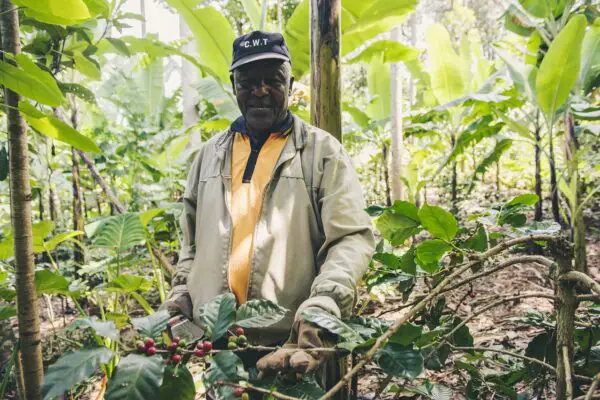Coffee a beverage loved by millions of people around the world has a rich and fascinating history spanning centuries. From its humble beginnings in ancient times to the global phenomenon it is today coffee has captivated people with its aroma and invigorating properties. In this article we will embark on a journey to discover the origins of coffee following the path from its discovery to its widespread cultivation and consumption around the world.
Table of contents
The Discovery of Coffee
The story of coffee begins in the ancient lands of Ethiopia where legend tells of a goat herder named Kaldi. One day Kaldi noticed his goats becoming lively and energetic after consuming the berries of a certain plant. Curious he tried the berries himself and experienced a similar invigorating effect. News of this discovery spread and the knowledge of coffee’s stimulating properties started to spread throughout the region.
Rise of Coffee in Arabia
Coffee cultivation and consumption gradually spread to the Arabian Peninsula particularly in Yemen during the 15th century. The Arabians were among the first to cultivate coffee on a larger scale establishing coffee plantations and developing techniques for roasting and brewing the beans. Coffee houses known as “qahwah” in Arabic became social and intellectual hubs where people gathered to drink coffee engage in discussions and exchange ideas. The popularity of coffee soon extended beyond the borders of Arabia reaching Egypt Persia and other parts of the Ottoman Empire.
Coffee Reaches Europe
Coffee’s journey to Europe can be attributed to trade and exploration. European merchants and travelers encountered coffee during their voyages to the Middle East and brought the mysterious beans back to their homelands. The first coffeehouse in Europe opened in Venice Italy in the early 17th century sparking a trend that quickly spread to other European cities. Coffeehouses became vibrant spaces for socializing conducting business and discussing politics and literature.
The Influence of Coffee on the New World
As European colonial powers expanded their reach so did the cultivation of coffee. Coffee plants were introduced to the New World with the Dutch being the first to establish coffee plantations in their colonies. The popularity of coffee grew steadily and by the 18th century coffee cultivation was thriving in countries such as Brazil Colombia and Haiti. The New World soon emerged as a significant player in the global coffee market with its fertile soils and favorable climates contributing to the production of high-quality beans.
Industrialization and the Coffee Industry
The industrial revolution of the 19th century had a profound impact on the coffee industry. Advances in transportation and technology revolutionized the production processing and distribution of coffee. Coffee plantations became more efficient allowing for larger-scale cultivation and increased yields. Railways and steamships facilitated the transportation of coffee from remote regions to urban centers and export markets. As coffee production expanded it became a major commodity traded on international markets.
The Art and Science of Coffee Today
In the modern era coffee has evolved into an art form and a science. Specialty coffee roasters and baristas meticulously source and roast beans striving to bring out the unique flavors and characteristics of different coffee origins. The third wave of coffee characterized by a focus on quality sustainability and traceability has gained momentum. Consumers now have access to a diverse range of single-origin coffees each with its own distinct flavor profile.
Fair Trade and Direct Trade
Alongside the growth of specialty coffee the importance of ethical sourcing and sustainability has gained prominence. Fair trade and direct trade practices aim to ensure that coffee farmers receive fair compensation for their labor and to promote environmentally friendly cultivation methods. These practices empower farmers and contribute to the long-term sustainability of the coffee industry.
Coffee’s Global Impact
Coffee has undoubtedly become a global phenomenon shaping economies cultures and social interactions worldwide. It is a beverage that brings people together transcending boundaries and bridging cultures. From the bustling streets of coffeehouses in Europe to the vibrant coffee cultures in Latin America Africa and Asia coffee continues to be a source of inspiration delight and connection.
FAQS
1. Where did coffee originate and what is its ancient history?
- Coffee is believed to have originated in Ethiopia where legend has it that a goat herder discovered its stimulating effects. The earliest credible evidence of coffee drinking dates back to the 15th century in the Sufi monasteries of Yemen.
2. How did coffee spread from Ethiopia to other parts of the world?
- Coffee was introduced to the Arabian Peninsula through trade and it gained popularity in coffee houses in Mecca. By the 17th century coffee had spread to Europe reaching coffeehouses in major cities.
3. What role did coffee play in Middle Eastern cultures historically?
- In the Middle East coffee became deeply integrated into social and cultural practices with coffeehouses serving as intellectual hubs where people gathered for discussions music and games.
4. When and how did coffee reach Europe and become popular?
- Coffee arrived in Europe in the 17th century with the first coffeehouse opening in Venice in 1645. The vibrant atmosphere of coffeehouses contributed to their popularity across the continent.
5. How did coffee cultivation spread to different parts of the world?
- Coffee cultivation expanded through colonization with European powers establishing plantations in various regions. Coffee was introduced to the Caribbean Central and South America and Southeast Asia.
6. What is the significance of coffee in the history of colonialism and trade?
- Coffee played a major role in the era of colonialism shaping trade routes and economies. Plantations in countries like Brazil and Java became central to the global coffee trade.
7. How did coffee become a global commodity and what challenges were faced in its cultivation?
- Coffee’s global popularity led to the establishment of large-scale plantations often facing challenges such as pests diseases and labor issues. The demand for coffee as a commodity continued to rise.
8. What were the socio-cultural impacts of coffee in the Enlightenment period?
- Coffeehouses in Europe during the Enlightenment period became centers for intellectual exchange fostering discussions among philosophers writers and artists.
9. How has the coffee industry evolved in the modern era?
- The 19th and 20th centuries saw the rise of coffee as a mass-market beverage with the development of instant coffee and the growth of global coffee chains.
10. What is the current state of the coffee industry and how has consumer awareness impacted it? – Today the coffee industry is diverse with a focus on sustainability fair trade and specialty coffee. Consumer awareness has led to increased demand for ethically sourced and high-quality coffee.
A Journey Worth Savoring
As we explore the origins of coffee we gain a deeper appreciation for the journey that each cup of coffee takes from the farms where it is grown to the cafes where it is savored. The next time you indulge in a cup of coffee take a moment to reflect on the rich history and global heritage encapsulated within that humble brew.

Hi, I’m Jodie! I’m a spain-Moroccan writer with a passion for imagination, adventures, magic and stories with heart.
Please don’t hesitate to contact me for any questions, suggestions, comments or feedback.

















Add comment